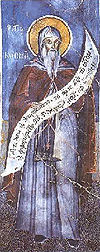- Cosmas of Maiuma
-
Saint Cosmas of Maiuma 
Hagiopolites Born 8th century
JerusalemDied 8th century
Maiuma, GazaHonored in Eastern Orthodox Church,
Eastern Catholic ChurchesFeast October 12 Attributes Vested as a bishop, or as a monk, holding a scroll with the words of one of his hymns Patronage Hymnographers Saint Cosmas of Maiuma, also called Cosmas Hagiopolites ("of the Holy City"), Cosmas of Jerusalem, or Cosmas the Melodist, or Cosmas the Poet (d. 773 or 794),[1] was a bishop and hymnographer (writer of hymns) of the Eastern Orthodox Church.
Contents
Life
Saint Cosmas (Greek: Κοσμάς) was probably born in Damascus, but he was orphaned at a young age. He was adopted by Sergius, the father of St. John of Damascus (ca.676 - 749), and became John's foster-brother. The teacher of the two boys was an elderly Calabrian monk, also named Cosmas (known as "Cosmas the Monk" to distinguish him), who had been freed from slavery to the Saracens by St. John's father.[2] John and Cosmas went from Damascus to Jerusalem, where both became monks in the Lavra (monastery) of St. Sabbas the Sanctified near that city.[2] Together they helped defend the Church against the heresy of iconoclasm.
Cosmas left the monastery in 743 when he was appointed Bishop of Maiuma, the port of ancient Gaza.[2] He outlived St. John by many years and died in great old age.
Works
As a learned prose-author, Cosmas wrote commentaries, or scholia, on the poems of St. Gregory of Nazianzus. He is regarded with great admiration as a poet. St. Cosmas and St. John of Damascus are considered to be the best representatives of the later Greek classical hymnography, the most characteristic examples of which are the artistic liturgical chants known as "canons". They worked together on developing the Octoechos.[2]
Saint Cosmas has been called "a vessel of divine grace" and "the glory of the Church."[3] He composed the solemn canons for Matins of Lazarus Saturday, Palm Sunday, the Triodes (canons with only three Canticles) which are chanted during Holy Week, and the first canon of the Nativity (based on a Nativity sermon by St. Gregory the Theologian). Altogether, fourteen canons are attributed to him in the liturgical books of the Orthodox Church.[4] His most well-known composition is "More honourable than the cherubim…" (which is included in the Axion Estin), sung regularly at Matins, the Divine Liturgy and other services.
The hymns of St. Cosmas were originally intended for the Divine Services of the Church of Jerusalem, but through the influence of Constantinople their use became universal in the Orthodox Church. It is not certain, however, that all the hymns ascribed to Cosmas in the liturgical books were really his compositions, especially as his teacher of the same name was also a hymn writer.[2]
The Eastern Orthodox Church observes his feast on October 12 (for those Orthodox Christians who follow the Julian Calendar, October 12 falls on October 25 of the Gregorian Calendar).
Notes
- ^ Other sources give the dates of his life as ca. 675 - ca. 751. Kathryn Tsai, A Timeline of Eastern Church History (Divine Ascent Press, Point Reyes Station, CA, 2004), p. 144.
- ^ a b c d e Baumstark, Anton. "Cosmas". The Catholic Encyclopedia. New Advent. http://www.newadvent.org/cathen/04403d.htm. Retrieved 9 April 2011.
- ^ Alexander A. Bogolepov, The hymns of the Orthodox Church, Orthodox Hymns of Christmas, Holy Week and Easter. Accessed 2007-04-02.
- ^ Tsai, op. cit.
Bibliography
- Collections of hymns, varying in number, are attributed to Cosmas, and may be found in Jacques-Paul Migne, Patrologia Graecae (P.G.), XCVIII, 459-524, and in Christ-Paranikas, Anthologia graeca carminum christianorum (Leipzig, 1871), 161-204.
- For the above-mentioned scholia on the poems of Gregory of Nazianzus, see Cardinal Angelo Mai, Spicilegium Romanum, II, Pt. II, 1-375, and Migne, P.G., XXXVIII, 339-679.
- In general, see Krumbacher, Gesch. der byzantinischen Literatur (2d ed., Munich, 1896), 674 sqq.
See also
- Sts. Cosmas and Damian, 3rd century martyrs
External links
- Cosmas the Hymnographer article from Orthodox Wiki (with icon)
- Kosmas the Hagiopolite Icon and brief life
- Cosmas article in Catholic Encyclopedia, 1913
- St. Cosmas the Hymnographer, Bishop of Maiuma Orthodox icon and synaxarion
- The Venerable Cosmas of Maiuma entry for October 12 in the Prologue from Ochrid by Bishop Nikolai Velimirovich
 This article incorporates text from a publication now in the public domain: Herbermann, Charles, ed (1913). Catholic Encyclopedia. Robert Appleton Company.Categories:
This article incorporates text from a publication now in the public domain: Herbermann, Charles, ed (1913). Catholic Encyclopedia. Robert Appleton Company.Categories:- Byzantine composers
- 8th-century deaths
- 8th-century composers
- Syrian saints
- Syrian Roman Catholic saints
- Eastern Orthodox saints
- Eastern Catholicism
- 8th-century bishops
- Palestinian Christian monks
- 8th-century Christian saints
- Byzantine hymnographers
Wikimedia Foundation. 2010.
